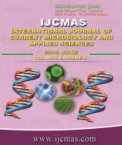


 National Academy of Agricultural Sciences (NAAS)
National Academy of Agricultural Sciences (NAAS)

|
PRINT ISSN : 2319-7692
Online ISSN : 2319-7706 Issues : 12 per year Publisher : Excellent Publishers Email : editorijcmas@gmail.com / submit@ijcmas.com Editor-in-chief: Dr.M.Prakash Index Copernicus ICV 2018: 95.39 NAAS RATING 2020: 5.38 |
Brinjal growers of Assam completely depend on the chemocentric cultivation practices to combat the crop diseases, which increases the cost of cultivation and affect the consumers with pesticides residues. Moreover, excessive use of a wide range of fungicides has resulted harmful effect to the environment and increased the resistant pathogen populations. Development of an alternative eco-friendly disease management module for sustainable crop production is the need of the hour. Present study was conducted to find out the effective biocontrol agents against important pathogens of brinjal showed that out of six (6) indigenous biocontrol agents viz. Beauveria bassiana, Metarhizium anisopliae, Trichoderma asperellum, T. harzinum, Paecilomyces lilacinus and Gliocladium virens, T. harzianum showed maximum inhibition of Rhizoctonia solani (74.44%), Fusarium solani (70.68%), Alternaria melongenae (72.48%), Sclerotinia sclerotiorum (69.15%) and Phomopsis vexans (77.82). T. asperellum and G. virens also showed significantly better inhibition against these pathogens causing diseases in brinjal over B. bassiana, M. anisopliae and P. lilacinus. The present study showed that T. harzianum, T. asperellum and G. virens can be used for preparation of bioformulation for management of diseases of brinjal.
 |
 |
 |
 |
 |